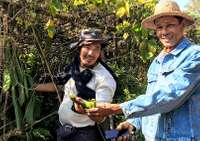Tiêu điểm Thành viên của ECHOcommunity: Ông Tuntun và Thaung Si 2020-04-08

Đoạn trích từ một báo cáo của Patrick Trail – ECHO Asia
Khi tôi đi dạo quanh trang trại với ông Tuntun ở vùng nông thôn Myanmar, tôi đã không thể làm gì khác ngoài việc mỉm cười khi ông ấy tự hào cho tôi xem than sinh học mà ông tạo ra và sử dụng trong hỗn hợp bầu cho cây giống cây ăn quả của mình. Thay vì đem đi đốt, thì giờ ông đã biến chất thải hữu cơ từ trang trại của mình thành một nguồn tài nguyên quý giá có thể được sử dụng để sản xuất nhiều cây trồng hơn, thay vì để mất cacbon vào khí quyển qua khói.
Khoảng một năm trước, ông Tuntun đã tham dự Hội thảo Tiết kiệm Hạt giống (Seed Saving Workshop) ở Pyin Oo Lwin và học cách tạo ra than sinh học nhờ vào một trong những buổi thực hành. Ông đã ngay lập tức trở về nhà và thử cách làm này, và đã rất thành công. Thậm chí, ông Tuntun hiện còn là chủ của một trang facebook nơi ông chia sẻ các thực hành canh tác của mình với các nông dân Miến Điện khác, giải thích các cách thực hành như than sinh học, ở giữa nhiều người khác!

Ông Thaung Si (trái) và ông Tuntun (phải) đang khoe thành quả hạt đậu kiếm đến từ Ngân hàng Hạt giống châu Á ECHO và hiện đang được trồng để cung cấp cho ngân hàng hạt giống tại khu vực đó ở Myanmar.
Rất nhiều điều đã xảy ra ở đây bắt nguồn từ đối tác quan trọng của chúng tôi trong khu vực này, ông Thaung Si. Là một người bạn và đối tác lâu năm của ECHO Asia, ông Thaung Si đã nhiều dịp tham gia cùng chúng tôi trong các sự kiện đào tạo và chúng tôi cũng đã học được nhiều điều từ ông ấy. Ba năm trước, ông đã thành lập một Ngân hàng Hạt giống Cộng đồng (Community Seed Bank) tại Viện Thần học Lisu Bap tít (Lisu Baptist Theological Seminary). Thông qua ngân hàng hạt giống của mình, ông giảng dạy các thực hành trong nông nghiệp và làm vườn cho sinh viên, và đã có tác động lớn đến nhiều cuộc sống, gieo nhiều loại hạt giống khác nhau. Chính tại đây, ông Tuntun và gần một trăm nông dân và người tham gia khác ở địa phương đã được đào tạo về than sinh học và các kỹ thuật khác vào năm ngoái, và ông Thaung Si cũng thường xuyên theo sát họ.
Cộng đồng ECHO có nhiều đối tác tận tâm như ông Thaunag Si trên toàn bộ khu vực này và trên toàn thế giới. Những đối tác này, khi họ được trang bị tốt, thì họ đều có khả năng trang bị nhiều hơn nữa!